Last Updated on September 26, 2025 by Ewen Finser
If you’re thinking about selling your business, you already know it’s one of those things in life you have to get right. Now, I won’t go into the details of everything you need to pull together to start the sales process. There’s a useful guide here that contains a lot of what you need to know.
But I do want to talk about Flippa because you’ve no doubt come across it as you prepare to sell your business. But that doesn’t mean it’s the best choice for you. With that in mind, let’s look at six of the best Flippa alternatives.
6 Flippa Alternatives
1. Quiet Light
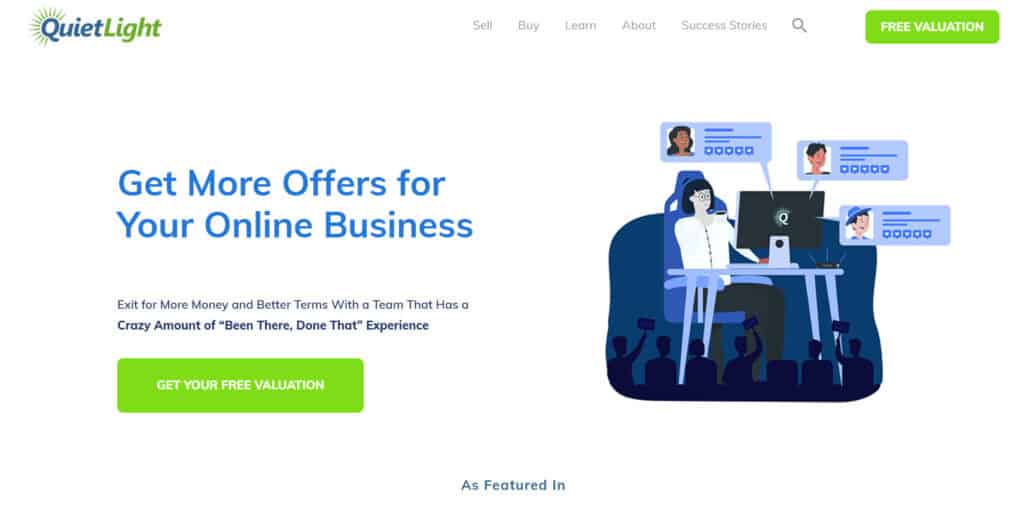
The first option is to go off-market, go the broker route, and therefore avoid all of the stress and hassle of a public listing.
Quiet Light is a brokerage where the founders have all exited their own businesses at various points. This is a valuable skill and one that can’t be taught.
It shows that the team completely understands the upsides, pitfalls, and challenges when selling a business, and this is infused into how Quiet Light supports founders who want to sell, and buyers who are looking to make an acquisition.
It’s also useful and a credit to the Quiet Light team that they won’t try to sell any and every business that comes to them. They’ll first make sure that your business is sale-ready, and that you’re ready to go through the sales process, which will also ensure you get the best price possible.
All of these are things that M&A platforms won’t put as much emphasis on. Flippa (and most of its alternatives) are simply looking to get as many businesses listed and paying fees as possible, even if a company isn’t sale-ready. Quiet Light is different, and if your business is sale-ready, then they will support you every step of the way.
The upside of this is that, based on their processes and network of qualified buyers, they do everything possible to ensure that 85% of sales happen within 90 days. The downside, of course, is that you may not qualify.
2. Acquire
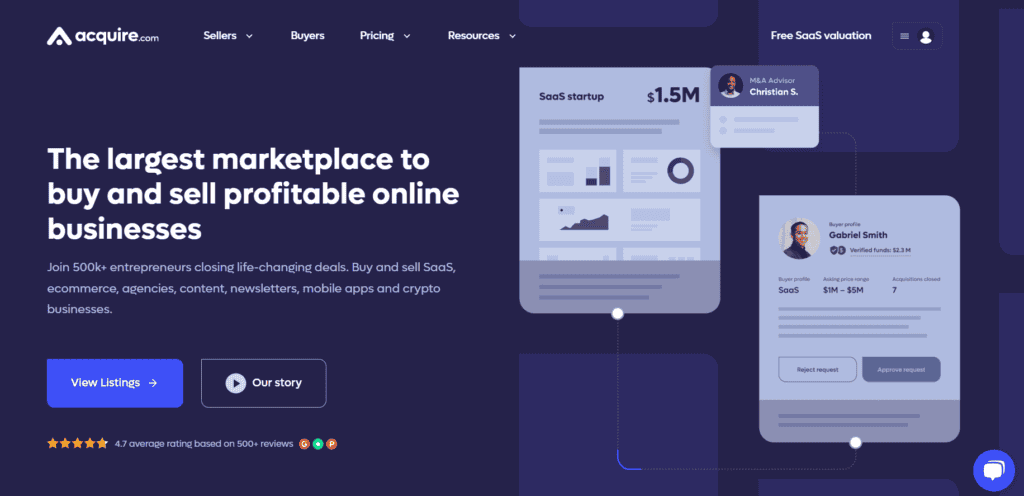
Next up is Acquire, another one that you’ve probably heard of, especially if you are a SaaS, solo/indie, or AI startup founder.
It’s not that they only serve those markets; it’s simply that those are the markets and segments that Acquire has the most experience with and serves better than others.
More than 2000 startups have been sold through Acquire, with a combined deal value of over $500 million. From start to finish, Acquire says that the process to sell is around 90 days, and reviews suggest they are good at this, with average ratings of 4.7/5.
Because the service is a mix of automated, done-for-you marketing and brokerage, it’s not cheap. But it could prove to be effective if you’re a SaaS founder looking for a buyer.
3. Investors Club
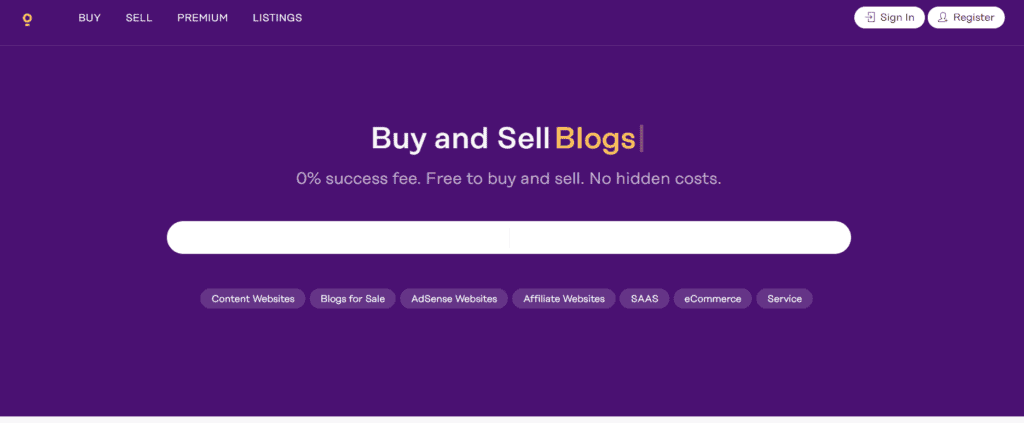
Investors Club seems to serve more of the lower-end of the M&A market, closer to the 5 than the 7-figure exit range. Hence why it costs zero to list and zero to shop for potential buyers.
For this reason, most listings are free unless you choose to pay for a Premium listing and support. If you do, then there’s also a success fee, which can be anywhere from 5% to 30% of the sale price of your business. You may have luck on here, but as always, you get what you pay for.
4. BizBuySell
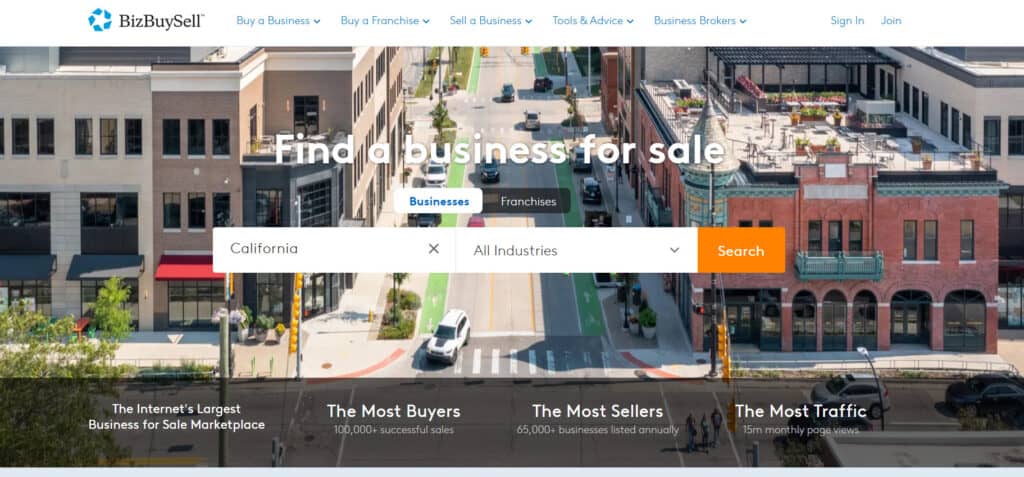
With over 15 million page views and 65,000 businesses getting listed every year, BizBuySell is a busy and popular M&A platform.
However, the downsides of that are the fact that once listed, you could end up inundated with time-wasters and tire-kickers. That’s one of the dangers of listing on high-traffic sites like this.
Have a plan if you aim to sell via BizBuySell or similar platforms. Know how you will tackle the vetting process.
5. Onfolio
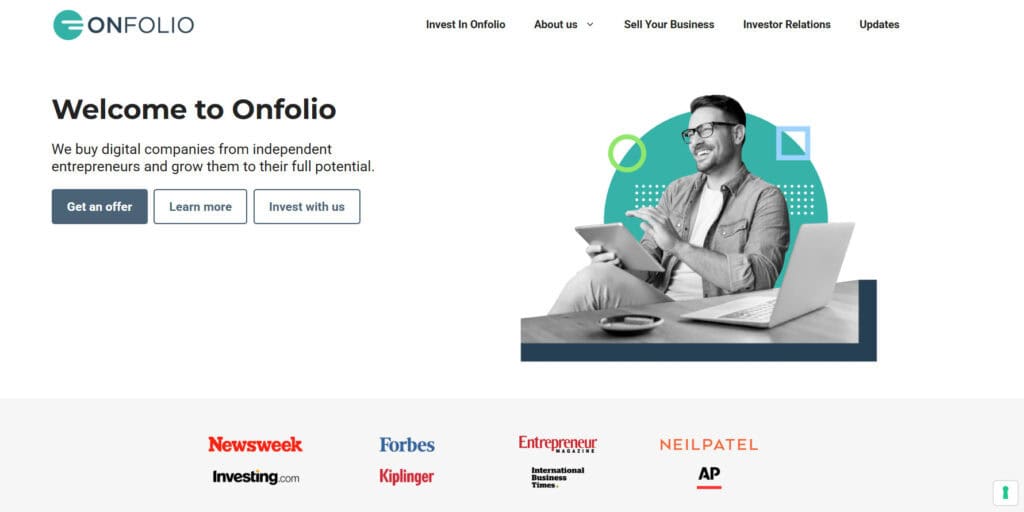
Onfolio is a little different. It’s neither an M&A platform nor a broker, although they will refer you to brokers if your business isn’t suitable but is sale-ready.
Onfolio is a Nasdaq-listed M&A portfolio that is busy buying (mainly) agencies with over $500K in profits, solid teams (or at least, solid processes), growth potential, and founders that want to hand over the reins to experienced operators/managers.
Onfolio has been around for a few years now, continues to grow and centralize certain functions, like sales, and could be ideal for agency founders looking to exit.
6. Empire Flippers
First launched in 2011 as AdSense Flippers, Empire Flippers has evolved into one of the world’s leading M&A platforms.
EF seems to specialize in selling Amazon-based businesses, and other eCommerce ones, so they’re more B2C and DTC than SaaS and B2B experts.
They’ve got an extensive list of criteria for what they can and can’t sell and what you need to give before they can list your business. As a result, it can take a while to get listed and then find a buyer.
If they do find you a buyer, then the success fees they take are on a sliding scale, anywhere from 15% for under $700,000, and going up (or rather, down) to 2.5% for anything valued over $5 million.
If I were going to sell a business today, I’d go with Quiet Light for numerous reasons. I think it’s worth it to have a team that knows how to position your company, will go out and look for buyers, and will vet them before making an introduction. That’s a massive time-saver and makes the whole process a lot less stressful.
Other top options include Acquire for SaaS and Onfolio for agencies. Both of these having niche specialties makes the process better for all involved.

